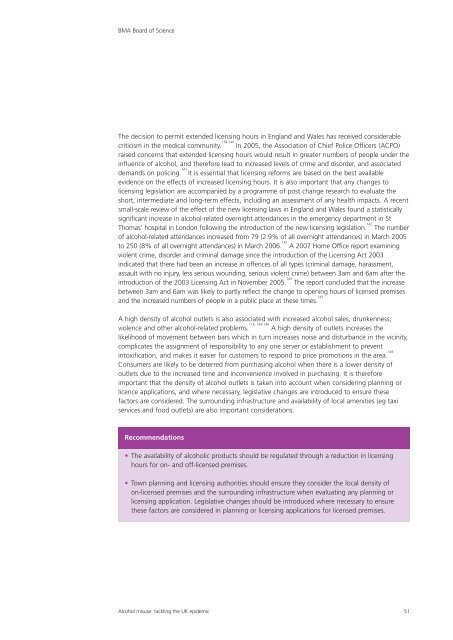Alcohol misuse: tackling the UK epidemic - London
Alcohol misuse: tackling the UK epidemic - London
Alcohol misuse: tackling the UK epidemic - London
Create successful ePaper yourself
Turn your PDF publications into a flip-book with our unique Google optimized e-Paper software.
BMA Board of Science<br />
The decision to permit extended licensing hours in England and Wales has received considerable<br />
criticism in <strong>the</strong> medical community. 138-140<br />
In 2005, <strong>the</strong> Association of Chief Police Officers (ACPO)<br />
raised concerns that extended licensing hours would result in greater numbers of people under <strong>the</strong><br />
influence of alcohol, and <strong>the</strong>refore lead to increased levels of crime and disorder, and associated<br />
demands on policing. 141<br />
It is essential that licensing reforms are based on <strong>the</strong> best available<br />
evidence on <strong>the</strong> effects of increased licensing hours. It is also important that any changes to<br />
licensing legislation are accompanied by a programme of post change research to evaluate <strong>the</strong><br />
short, intermediate and long-term effects, including an assessment of any health impacts. A recent<br />
small-scale review of <strong>the</strong> effect of <strong>the</strong> new licensing laws in England and Wales found a statistically<br />
significant increase in alcohol-related overnight attendances in <strong>the</strong> emergency department in St<br />
Thomas’ hospital in <strong>London</strong> following <strong>the</strong> introduction of <strong>the</strong> new licensing legislation. 142<br />
The number<br />
of alcohol-related attendances increased from 79 (2.9% of all overnight attendances) in March 2005<br />
to 250 (8% of all overnight attendances) in March 2006. 142<br />
A 2007 Home Office report examining<br />
violent crime, disorder and criminal damage since <strong>the</strong> introduction of <strong>the</strong> Licensing Act 2003<br />
indicated that <strong>the</strong>re had been an increase in offences of all types (criminal damage, harassment,<br />
assault with no injury, less serious wounding, serious violent crime) between 3am and 6am after <strong>the</strong><br />
introduction of <strong>the</strong> 2003 Licensing Act in November 2005. 143<br />
The report concluded that <strong>the</strong> increase<br />
between 3am and 6am was likely to partly reflect <strong>the</strong> change to opening hours of licensed premises<br />
and <strong>the</strong> increased numbers of people in a public place at <strong>the</strong>se times. 143<br />
A high density of alcohol outlets is also associated with increased alcohol sales, drunkenness,<br />
114, 144-149<br />
violence and o<strong>the</strong>r alcohol-related problems. A high density of outlets increases <strong>the</strong><br />
likelihood of movement between bars which in turn increases noise and disturbance in <strong>the</strong> vicinity,<br />
complicates <strong>the</strong> assignment of responsibility to any one server or establishment to prevent<br />
intoxification, and makes it easier for customers to respond to price promotions in <strong>the</strong> area. 149<br />
Consumers are likely to be deterred from purchasing alcohol when <strong>the</strong>re is a lower density of<br />
outlets due to <strong>the</strong> increased time and inconvenience involved in purchasing. It is <strong>the</strong>refore<br />
important that <strong>the</strong> density of alcohol outlets is taken into account when considering planning or<br />
licence applications, and where necessary, legislative changes are introduced to ensure <strong>the</strong>se<br />
factors are considered. The surrounding infrastructure and availability of local amenities (eg taxi<br />
services and food outlets) are also important considerations.<br />
Recommendations<br />
The availability of alcoholic products should be regulated through a reduction in licensing<br />
hours for on- and off-licensed premises.<br />
Town planning and licensing authorities should ensure <strong>the</strong>y consider <strong>the</strong> local density of<br />
on-licensed premises and <strong>the</strong> surrounding infrastructure when evaluating any planning or<br />
licensing application. Legislative changes should be introduced where necessary to ensure<br />
<strong>the</strong>se factors are considered in planning or licensing applications for licensed premises.<br />
<strong>Alcohol</strong> <strong>misuse</strong>: <strong>tackling</strong> <strong>the</strong> <strong>UK</strong> <strong>epidemic</strong> 51
















